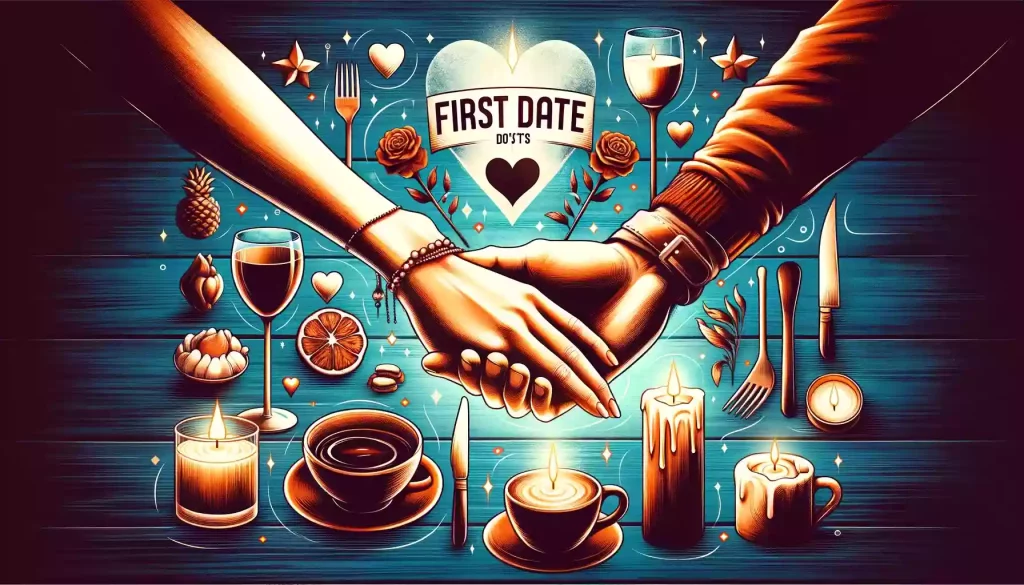Key Takeaways:
- Embrace the core principles of dating by understanding personal needs and preferences.
- Craft an engaging online dating profile that truly reflects your personality and interests.
- Learn to recognize red flags early in a relationship to avoid potential heartache.
- Effective communication and trust-building are the cornerstones of any healthy relationship.
- Adopt a balanced approach to dating, maintaining personal independence while nurturing a partnership.
Understanding the Basics of Dating
The journey of dating begins with self-awareness. Knowing what you seek in a partner and relationship is the first step towards successful dating. This includes understanding your own emotional needs, life goals, and deal-breakers. Embracing these personal truths is essential for finding a compatible partner.
Exploring different dating avenues, from online platforms to traditional methods, widens your horizons. Each method has its unique advantages and challenges. For instance, online dating offers a vast pool of potential matches, while meeting someone through friends might lead to more meaningful connections.
First impressions count in dating, but authenticity is key. It's important to present yourself honestly while also putting your best foot forward. This balance is crucial for attracting someone who likes you for who you truly are.
Dating should be a fun and exploratory process. While the ultimate goal might be a serious relationship, enjoying the journey is important. This includes embracing both the highs and the lows that come with meeting new people and forging new connections.
Finally, setting realistic expectations is crucial. Not every date will lead to a long-term relationship, and that's okay. Learning from each experience helps you refine what you're looking for in a partner and a relationship.
Creating an Appealing Online Dating Profile
Your online dating profile is your first chance to make a great impression. A well-crafted profile should accurately reflect your personality, lifestyle, and what you're looking for in a partner. Be honest, but also focus on your positive attributes.
Choose photos that show you in a good light. This doesn't just mean physically attractive, but photos where you're engaged in activities you love, with friends, or showing off a genuine smile. Avoid overly edited or misleading pictures, as they can lead to disappointments later.
The bio section is your opportunity to showcase your personality. Be creative and witty, but also clear about your interests and values. Avoid clichés and generic statements that don't differentiate you from others. Instead, share unique aspects of your life and personality.
Be clear about what you're looking for. Whether it's a serious relationship or casual dating, being upfront helps attract people with similar intentions. This honesty saves time and helps avoid misunderstandings.
Keep your profile updated. Regular updates show that you're actively engaged in the dating process and reflect any changes in your life or interests. This also helps keep your profile fresh and interesting to potential matches.
Finally, engage positively with others. Respond to messages thoughtfully and politely, even if you're not interested. This not only is good etiquette but also builds a positive online presence, increasing your chances of finding a good match.
First Date Do's and Don'ts

A first date can be exciting, but it's important to approach it with the right attitude and preparation. Here are some key do's and don'ts to help make your first date a success.
Do: Choose a comfortable and public place for your first meeting. It's essential for both parties to feel safe and relaxed. A coffee shop, a casual restaurant, or a park can be great choices.
Don't: Overwhelm your date with too much personal information or heavy topics. Keep the conversation light and positive, focusing on shared interests and getting to know each other.
Do: Be punctual. Arriving on time shows respect for your date and indicates that you value their time.
Don't: Spend the entire date glued to your phone. It's important to be present and engaged in the conversation, which shows interest and respect for your date.
Do: Dress appropriately for the occasion. It shows that you've put effort into your appearance and are taking the date seriously.
Don't: Set unrealistic expectations. Keep an open mind, as first impressions might not always be accurate. It's okay if there isn't immediate chemistry.
Do: Follow up after the date if you're interested. A simple message expressing your enjoyment of the date and interest in meeting again can go a long way.
Communicating Effectively in a Relationship
Effective communication is the foundation of any strong relationship. It's about more than just talking; it involves listening, understanding, and expressing yourself clearly.
Start by being a good listener. Pay attention to what your partner is saying and show empathy. This helps in understanding their perspective and builds a deeper connection.
Express yourself honestly and respectfully. Share your thoughts and feelings openly, but do so in a way that is considerate of your partner's feelings.
Non-verbal communication is also important. Pay attention to body language and tone of voice, as they can convey as much meaning as words.
Conflict is inevitable in any relationship, but how you communicate during these times is crucial. Approach disagreements with the intent to understand and resolve, rather than to win an argument.
Finally, remember that effective communication is a skill that can be developed. Be patient with yourself and your partner as you both learn to communicate better.
Recognizing Red Flags and Deal Breakers

Identifying red flags and deal breakers early in a relationship is crucial for your emotional well-being. These are warning signs that indicate potential problems in the future.
Red flags can vary widely, but some common ones include disrespect, dishonesty, and lack of communication. These behaviors can be indicative of deeper issues that may affect the health of the relationship.
Deal breakers are personal boundaries that, if crossed, mean the relationship isn't right for you. These could be issues like substance abuse, differing life goals, or incompatibility in values.
Trust your instincts. If something feels off, it's important to pay attention to that feeling. Often, our intuition can pick up on red flags before we're consciously aware of them.
Communicate your concerns with your partner. A healthy relationship should be able to withstand open and honest discussion about difficult topics.
If the red flags or deal breakers are too significant to overlook, it may be necessary to reconsider the relationship. Your well-being and happiness should always be a priority.
Balancing Independence and Partnership
Maintaining a balance between independence and partnership is key to a healthy relationship. It's important to have a sense of self while also being part of a couple.
Encourage and support each other's personal interests and hobbies. This not only helps maintain independence but also brings new experiences and perspectives into the relationship.
Communicate openly about your needs and boundaries. This includes discussing how much time you spend together versus apart, and respecting each other's need for personal space.
Remember, a strong partnership is made up of two strong individuals. By supporting each other's growth and independence, you strengthen the relationship as a whole.
Navigating Long-Distance Relationships

Long-distance relationships present unique challenges, but with commitment and communication, they can be deeply rewarding. The key is to maintain an emotional connection, despite the physical distance.
Regular communication is vital. This doesn't mean you need to be in constant contact, but establishing a routine for check-ins can help maintain a sense of closeness. Utilize different forms of communication, like texts, calls, and video chats, to keep things dynamic.
Trust and honesty are crucial in a long-distance relationship. Being open about your feelings and concerns can prevent misunderstandings and build a stronger bond.
Plan visits whenever possible. Spending quality time together in person is important for nurturing the relationship and creating memories. Meanwhile, having a future visit to look forward to can also be a great motivator during tougher times.
Building Trust and Emotional Intimacy
Trust and emotional intimacy are the backbones of any strong relationship. Building these requires time, patience, and effort from both partners.
Be reliable and consistent in your actions and words. Consistency builds trust over time, showing your partner that you are dependable and true to your word.
Share your thoughts and feelings openly. Vulnerability is key to emotional intimacy. By sharing your inner world, you invite your partner to understand you on a deeper level.
Listen actively to your partner. Show genuine interest in their thoughts, feelings, and experiences. This not only builds trust but also shows that you value them.
Respect each other's boundaries. Understanding and respecting personal limits is crucial for building trust and intimacy.
Remember, building trust and emotional intimacy is a continuous process. It evolves and deepens as the relationship grows.
Handling Relationship Conflicts Constructively
Conflicts are a natural part of any relationship, but it's how you handle them that can either strengthen or weaken your bond. Constructive conflict resolution is essential for a healthy partnership.
When a conflict arises, approach it with a problem-solving mindset rather than a combative one. Focus on finding a solution that works for both of you, rather than trying to 'win' the argument.
Listen to your partner's perspective without interrupting. Understanding their viewpoint can help you empathize with their feelings and needs, leading to more effective solutions.
Communicate your own feelings and needs clearly and respectfully. Avoid accusatory language and instead use "I" statements to express how you feel.
Take a break if emotions run high. Sometimes, stepping away from a heated discussion can give both partners time to cool down and think more clearly.
Planning Memorable Dates and Surprises
Spicing up your relationship with memorable dates and surprises keeps the romance alive. It’s about the thought and effort you put in, more than the extravagance of the gesture.
Consider your partner’s interests and preferences when planning a date. Whether it’s a night at the movies, a nature hike, or a cooking class, tailor the experience to what you both enjoy.
Seasonal activities can provide unique date ideas. A beach day in the summer, apple picking in the fall, a winter wonderland walk, or a spring garden tour can be delightful.
Don’t underestimate the power of a surprise. It could be as simple as cooking their favorite meal or as elaborate as a surprise weekend getaway.
Try something new together. Experimenting with a new hobby or activity can be a fun and bonding experience.
Remember, it’s the quality of time spent together that counts, not the amount of money spent. Even a simple picnic in the park can be romantic and memorable.
Celebrate important milestones and anniversaries. These are perfect opportunities to show your partner how much they mean to you with thoughtful gestures or surprises.
Maintaining a Healthy Work-Life-Dating Balance
Balancing your professional life, personal life, and dating can be challenging, but it's crucial for a fulfilling and well-rounded life. Here are some tips to help you find that balance.
First, prioritize your time and commitments. Understand that you can't do everything at once, and make conscious choices about how you spend your time. This might mean saying no to certain social events to spend quality time with your partner, or vice versa.
Communicate with your partner about your work commitments. Being open about your schedule can help avoid misunderstandings and set realistic expectations about the time you can spend together.
Make the most of the time you do have. Quality over quantity is key in relationships. Even if you can't spend a lot of time together, make sure the time you do have is meaningful and focused on each other.
Don't forget to take time for yourself. Personal time is crucial for your own well-being and can actually enhance your relationships. Engage in activities that relax and rejuvenate you.
Lastly, be flexible and adaptable. Sometimes work demands may increase, or your dating life may require more attention. Being able to adjust and find a new balance is essential.
Overcoming Common Dating Challenges
Dating can come with its fair share of challenges. Here's how you can navigate some of the most common ones.
Facing rejection is part of dating, but it doesn't have to define your experience. Remember that rejection is often not about you personally, but about incompatibility. Learning from each experience can help you move forward more confidently.
Overcoming dating fatigue is important, especially if you've been in the dating scene for a while. Take breaks when needed, and focus on self-care to rejuvenate yourself.
Finally, managing expectations is key. Understand that finding the right person can take time, and it's okay if not every date leads to a serious relationship. Stay positive and open to new experiences.
Advice for Dating in Different Life Stages
Dating can vary greatly depending on your stage in life, whether you're a young adult, in your mid-life, or entering the senior years. Each stage presents its unique set of challenges and opportunities.
In your 20s and 30s, you might be exploring different types of relationships to understand what you're looking for in a partner. This is a time for growth and learning, where you can establish your relationship goals and preferences.
Mid-life dating, often after a significant life change like divorce or loss, can feel daunting but also offers a chance for renewal and self-discovery. It's important to approach dating with openness and an understanding of your past experiences.
For seniors, dating might be about companionship and finding someone to share your golden years with. Honesty about your desires and expectations is key, as is being open to different types of relationships than you might have sought earlier in life.
Utilizing Dating 101 Book Strategies
The 'Dating 101 Book' offers a range of strategies to help navigate the dating world. Here are some key takeaways from the book that can be particularly helpful.
Understand yourself first. The book emphasizes the importance of knowing your own values, desires, and deal breakers. This self-awareness is crucial for finding a compatible partner.
Effective communication is another core theme. Whether it's conveying your feelings, setting boundaries, or discussing expectations, clear communication is essential for healthy relationships.
Patience in dating is also highlighted. The book advises taking the time to really get to know someone and not rushing into a relationship. It emphasizes that quality connections take time to develop.
Another strategy is to be proactive yet open. While it's good to have standards and a clear idea of what you're looking for, being too rigid can limit your opportunities. The book encourages a balance between selectiveness and openness.
The book also covers online dating, offering tips on creating engaging profiles and how to communicate effectively through digital platforms.
Finally, it addresses self-care and resilience. The dating journey can have its ups and downs, and taking care of your emotional and mental well-being is crucial.
FAQ: Frequently Asked Questions on Dating
Q: How do I know if I'm ready to start dating?
A: Assess your emotional readiness and whether you're open to the experience of meeting new people. If you feel curious, excited, and willing to put in the effort, it's a good sign you're ready.
Q: What are some good first date ideas?
A: Opt for activities that allow you both to converse and connect, like a coffee date, a walk in the park, or a casual dinner. The key is to choose an environment where you both feel comfortable.
Q: How can I deal with dating anxiety?
A: Remember that it's normal to feel nervous. Focus on the present moment, keep an open mind, and remind yourself that the goal is to learn about each other, not to impress.
Q: When is the right time to discuss exclusivity in a relationship?
A: This varies for each couple, but it's important to have this conversation when you feel you're both emotionally invested and interested in pursuing something more serious. Honest communication is crucial.
Key Takeaways from 'Dating 101 Book' for Lasting Relationships
The 'Dating 101 Book' provides a comprehensive guide to building and maintaining healthy, lasting relationships. Here are some key takeaways to consider.
Firstly, it emphasizes the importance of self-awareness in dating. Understanding your own needs, desires, and boundaries is crucial for finding and nurturing a compatible relationship.
Effective communication is highlighted as a key element. This includes not only how you talk and listen but also how you express and interpret non-verbal cues.
Patience and taking things slow are advised for building meaningful connections. Rushing into commitment without fully understanding each other can lead to issues later.
The book also stresses the importance of maintaining individuality within a relationship. Balancing personal growth with the growth of your relationship is essential for long-term happiness.
It encourages a proactive approach to dating but also stresses the importance of flexibility and open-mindedness. Being too rigid in your expectations can limit your chances of finding a truly compatible partner.
Lastly, the book underscores the significance of resilience and self-care. Dating can be a rollercoaster of emotions, and taking care of your mental and emotional health is vital.
Recommended Resources
- Modern Romance by Aziz Ansari and Eric Klinenberg, Penguin Press, 2015
- The New Rules of Love: How to Find the Right One for You by Dr. Helen Fisher, Henry Holt and Co., 2020
- Deeper Dating: How to Drop the Games of Seduction and Discover the Power of Intimacy by Ken Page, Shambhala, 2014


Recommended Comments
There are no comments to display.
Create an account or sign in to comment
You need to be a member in order to leave a comment
Create an account
Sign up for a new account in our community. It's easy!
Register a new accountSign in
Already have an account? Sign in here.
Sign In Now